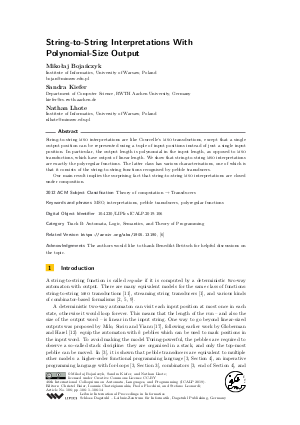@InProceedings{bojanczyk_et_al:LIPIcs.ICALP.2019.106,
author = {Boja\'{n}czyk, Miko{\l}aj and Kiefer, Sandra and Lhote, Nathan},
title = {{String-to-String Interpretations With Polynomial-Size Output}},
booktitle = {46th International Colloquium on Automata, Languages, and Programming (ICALP 2019)},
pages = {106:1--106:14},
series = {Leibniz International Proceedings in Informatics (LIPIcs)},
ISBN = {978-3-95977-109-2},
ISSN = {1868-8969},
year = {2019},
volume = {132},
editor = {Baier, Christel and Chatzigiannakis, Ioannis and Flocchini, Paola and Leonardi, Stefano},
publisher = {Schloss Dagstuhl -- Leibniz-Zentrum f{\"u}r Informatik},
address = {Dagstuhl, Germany},
URL = {https://drops.dagstuhl.de/entities/document/10.4230/LIPIcs.ICALP.2019.106},
URN = {urn:nbn:de:0030-drops-106821},
doi = {10.4230/LIPIcs.ICALP.2019.106},
annote = {Keywords: MSO, interpretations, pebble transducers, polyregular functions}
}

 Creative Commons Attribution 3.0 Unported license
Creative Commons Attribution 3.0 Unported license











